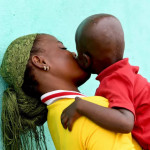 |
| Alysia Abbott |
I respected his motivation. Young gay men should know what their forefathers experienced, if only to understand how their community and civil rights came to be. These conversations are vital. But after being raised alone by a gay man, a man who also died of AIDS in 1992, I believed this history was my cultural heritage, too, and I felt shut out. I was a straight woman, a mom, not of David’s generation—who lost so many friends they had to toss out whole phone books—nor of the younger generation of gay men who were born too late to remember the “AIDS years.” It wasn’t an unfamiliar feeling. Growing up in the 1970s and ’80s, I often felt between two worlds—a little too straight for my father’s community, a little too gay for the larger straight world.
Thankfully, now I’d met people—living in Colorado, Philadelphia and New York—who also lost parents to AIDS. Some of these friends lost gay dads, but another lost a mom who’d contracted HIV through a blood transfusion. Still, we remembered our parents in relative isolation, with siblings or in hours-long telephone calls with each other. In her book Gentrification of the Mind: Witness to a Lost Imagination, Sarah Schulman guessed there must be thousands who’ve lost parents to AIDS, yet no national movement united us.
This is why the writer Whitney Joiner and I have started The Recollectors. We want to build an online community and storytelling forum dedicated to remembering parents lost to AIDS and the children they left behind. You might say the culture is at last ready for us. It sounds cynical to say AIDS stories are “trending,” but it’s true. AIDS is the topic, or backdrop, of several new books (my memoir Fairyland: A Memoir of My Father, but also Sean Strub’s Body Counts and Victoria Loustalot’s This is How You Say Goodbye) and award-winning documentaries and feature films (We Were Here, How to Survive a Plague and Dallas Buyers Club). Larry Kramer’s A Normal Heart, directed by Ryan Murphy, will be broadcast on HBO in May.
Watch this video to learn more about The Recollectors:
While I’m excited by this growing interest, I’m concerned that viewers and readers might see AIDS as a story that ended with the introduction of protease inhibitors in the mid ’90s instead of as a disease that’s ongoing and continues to impact people, including the lives of surviving children. Because my dad was openly gay, and I cared and mourned for him without any other family, I’ve been out about our story since he died 20 years ago. But since working on the Recollectors, I’ve discovered that my experience is more the exception than the rule.
Kids who lost parents to AIDS in their formative years were often taught that truth-telling is dangerous business. Whitney didn’t know her father was sick until five months before he died. After his death, her mother told her to tell friends he died of cancer because she wanted to protect her daughter from the bigotry of their rural Kentucky community. After artist/activist Kia Labeija’s mother died of AIDS in 1994, her father told her to move on, that it was better to forget the pain they’d been through. These sorts of lessons can be hard to unlearn.
Many “recollectors,” including adult children now in their 30s and 40s, have yet to shake off the secrecy around their parents’ deaths. Others, after losing mothers to AIDS, have grown up HIV positive themselves and still face stigma every day. Because many of these experiences haven’t been heard, these stories are in danger of being excluded from the larger AIDS narrative.
But the times have changed—and so have we. By memorializing our parents, parents who often died in the shadows, or shrouded in secrecy, we can put a face to the experience of AIDS and help break the stigma. As grown men and women, we can own our truths and reshape the arc of our stories. To recollect is to remember and there’s no shame in remembering. By finally sharing these stories, with one another and then publicly, we can reshape the conversation around AIDS today and into the future.
Alysia Abbott is a writer and author. Her book Fairyland: A Memoir of My Father was an ALA Stonewall Award winner. To learn more about her Recollector Kickstarter campaign, click here.






1 Comment
1 Comment